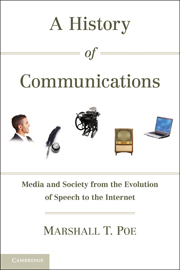4 - Homo Videns
Humanity in the Age of Audiovisual Media
Published online by Cambridge University Press: 05 June 2012
Summary
But I once heard a story I believe, I replied: How Leontius son of Aglaion, coming from Piraeus under the outer north wall, perceived corpses laid out near the gallows. He wanted to look, and at the same time he was disgusted with himself and turned away; he fought with himself for awhile and covered his face, but, overcome by desire, he held his eyes wide open and ran up to the corpses and said “Look, damn you. Take your fill of the lovely sight!”
– Plato, The Republic, 439E–440APlato didn't like artists, but he truly feared actors. Why? Because their craft corrupts otherwise good people. Drama pretends to show us life in all its richness, and it succeeds so well that it can and does trick almost everyone. When viewers see an actor pretending to be in pain, they are likely to feel as if they are witnessing actual pain. The really frightening part, though, is that we enjoy sympathizing with dramatists pretending to weep and wail, snort and chortle, and behave in all kinds of undignified ways. Thus, we find ourselves delighting in actions that we would ordinarily condemn. Eventually, Plato predicts, drama will corrupt us: if we view enough of it we will begin to act like the actors, that is, badly. Our moral decline is inevitable so long as the actors remain in the city, for so long as they do, we will compulsively seek vicarious gratification in their productions. Drama appeals so mightily to our base instincts that we won't be able to help ourselves. Thus, almost all actors must be sent away if the city is to survive.
Most modern folks rightly find Plato's arguments against drama unconvincing. That said, Plato makes one very good point about drama: as an artistic medium, it is – or at least can be – extraordinarily compelling. We can put down a book when we don't want to read it. We can tune out poetry or music when we don't want to listen. But when we hear or see people, particularly if they are saying or doing something odd, we feel we have to listen and look – just like Leontius in Plato's story. Leontius didn't want to look at the corpses, but he had to. Plato feared that if people were afforded the opportunity to see whatever they wanted, then they, like Leontius, would lose control of themselves. In this chapter, we will see that Plato's fears were not misplaced. By the mid-twentieth century, audiovisual media made it possible for anyone to see almost anything. The consequences were just as Plato predicted, for people did after a fashion lose control of themselves.
- Type
- Chapter
- Information
- A History of CommunicationsMedia and Society from the Evolution of Speech to the Internet, pp. 152 - 201Publisher: Cambridge University PressPrint publication year: 2010



